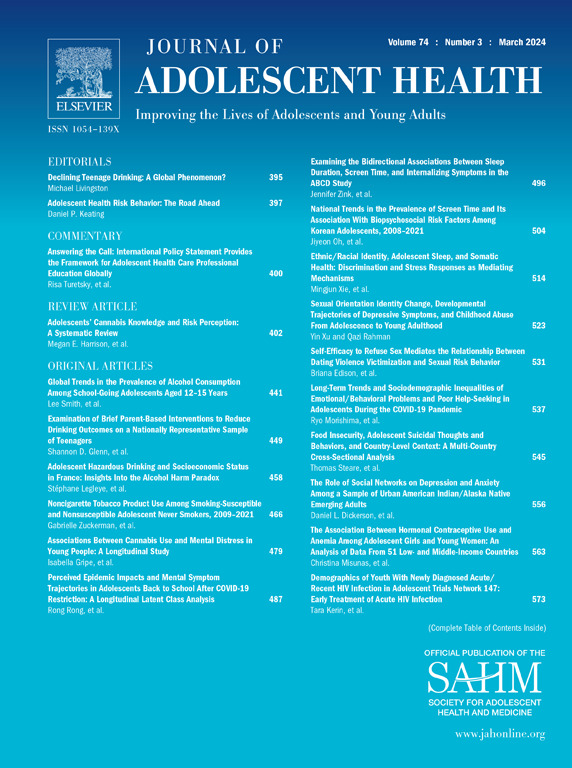A Sociocultural Perspective of HPV Vaccine-Related Decision Making Among Immigrant Mothers in the United States
IF 4.5
2区 医学
Q1 PEDIATRICS
引用次数: 0
Abstract
Purpose
The U.S. immigrants are at high risk for human papillomavirus (HPV) infection and death from HPV-related diseases. Children of immigrants have lower HPV vaccine initiation and completion rates compared to children of U.S.-born parents. Previous research suggests that sociocultural factors may play a role in these disparities, but this is still largely understudied. This study examines the relationship between sociocultural factors and immigrant mothers' HPV vaccine-related decision-making.
Methods
An online survey was administered to 272 immigrant women (18+ years) residing in the United States with children ages 9–25 years. Multivariate logistic regression was employed to determine sociocultural predictors (i.e., acculturation) of HPV vaccine initiation and refusal. We also examined the relationship between HPV vaccination behaviors and vaccine-related decision-making in immigrant households.
Results
Immigrant mothers who had a greater orientation toward their home culture were less likely to initiate HPV vaccination for their children (odds ratio [OR] = 0.92; 95% CI [0.87, 0.98]). Mothers who made vaccination decisions for their families either solely (OR = 0.37; 95% CI [−0.99, 0.47]) or jointly with their partners (OR = 0.24; 95% CI [−1.42, 0.46]) were less likely to refuse HPV vaccination for their children compared to mothers who relied solely on their partners to make these decisions. Lastly, mothers who were more adapted to the United States were more likely to make vaccination decisions jointly with their partners (OR = 1.03; 95% CI [1.01, 1.06]).
Discussion
Findings show that acculturation and decision-making processes in immigrant households are significantly associated with HPV vaccination. Culturally appropriate interventions that address both partners' perceived barriers to HPV vaccination are needed.
美国移民母亲中HPV疫苗相关决策的社会文化视角
目的:美国移民感染人乳头瘤病毒(HPV)和死于HPV相关疾病的风险很高。与在美国出生的父母的孩子相比,移民的孩子有更低的HPV疫苗接种和完成率。先前的研究表明,社会文化因素可能在这些差异中发挥作用,但这在很大程度上仍未得到充分研究。本研究探讨社会文化因素与移民母亲HPV疫苗相关决策的关系。方法:对272名移民妇女(18岁以上)进行在线调查,她们有9-25岁的孩子。采用多元逻辑回归来确定HPV疫苗接种和拒绝接种的社会文化预测因子(即文化适应)。我们还研究了移民家庭中HPV疫苗接种行为与疫苗相关决策之间的关系。结果:对本国文化有更大倾向的移民母亲不太可能为子女接种HPV疫苗(优势比[OR] = 0.92;95% ci[0.87, 0.98])。仅为家人做出疫苗接种决定的母亲(OR = 0.37;95% CI[-0.99, 0.47])或与伴侣共同(or = 0.24;95% CI[-1.42, 0.46])与完全依赖伴侣做出决定的母亲相比,拒绝为孩子接种HPV疫苗的可能性更小。最后,更适应美国的母亲更有可能与伴侣共同做出疫苗接种决定(OR = 1.03;95% ci[1.01, 1.06])。讨论:研究结果表明,移民家庭的文化适应和决策过程与HPV疫苗接种显著相关。需要采取文化上适当的干预措施,解决双方认为存在的HPV疫苗接种障碍。
本文章由计算机程序翻译,如有差异,请以英文原文为准。
求助全文
约1分钟内获得全文
求助全文
来源期刊

Journal of Adolescent Health
医学-公共卫生、环境卫生与职业卫生
CiteScore
10.40
自引率
3.90%
发文量
526
审稿时长
46 days
期刊介绍:
The Journal of Adolescent Health is a scientific publication dedicated to enhancing the health and well-being of adolescents and young adults. Our Journal covers a broad range of research topics, spanning from the basic biological and behavioral sciences to public health and policy. We welcome a variety of contributions, including original research papers, concise reports, literature reviews, clinical case reports, opinion pieces, and letters to the editor. We encourage professionals from diverse disciplines such as Anthropology, Education, Ethics, Global Health, Health Services Research, Law, Medicine, Mental and Behavioral Health, Nursing, Nutrition, Psychology, Public Health and Policy, Social Work, Sociology, and Youth Development to share their expertise and contribute to our mission of promoting adolescent health. Moreover, we value the voices of young individuals, family and community members, and healthcare professionals, and encourage them to submit poetry, personal narratives, images, and other creative works that provide unique insights into the experiences of adolescents and young adults. By combining scientific peer-reviewed research with creative expressions, our Journal aims to create a comprehensive understanding of the challenges and opportunities in adolescent and young adult health.
 求助内容:
求助内容: 应助结果提醒方式:
应助结果提醒方式:


